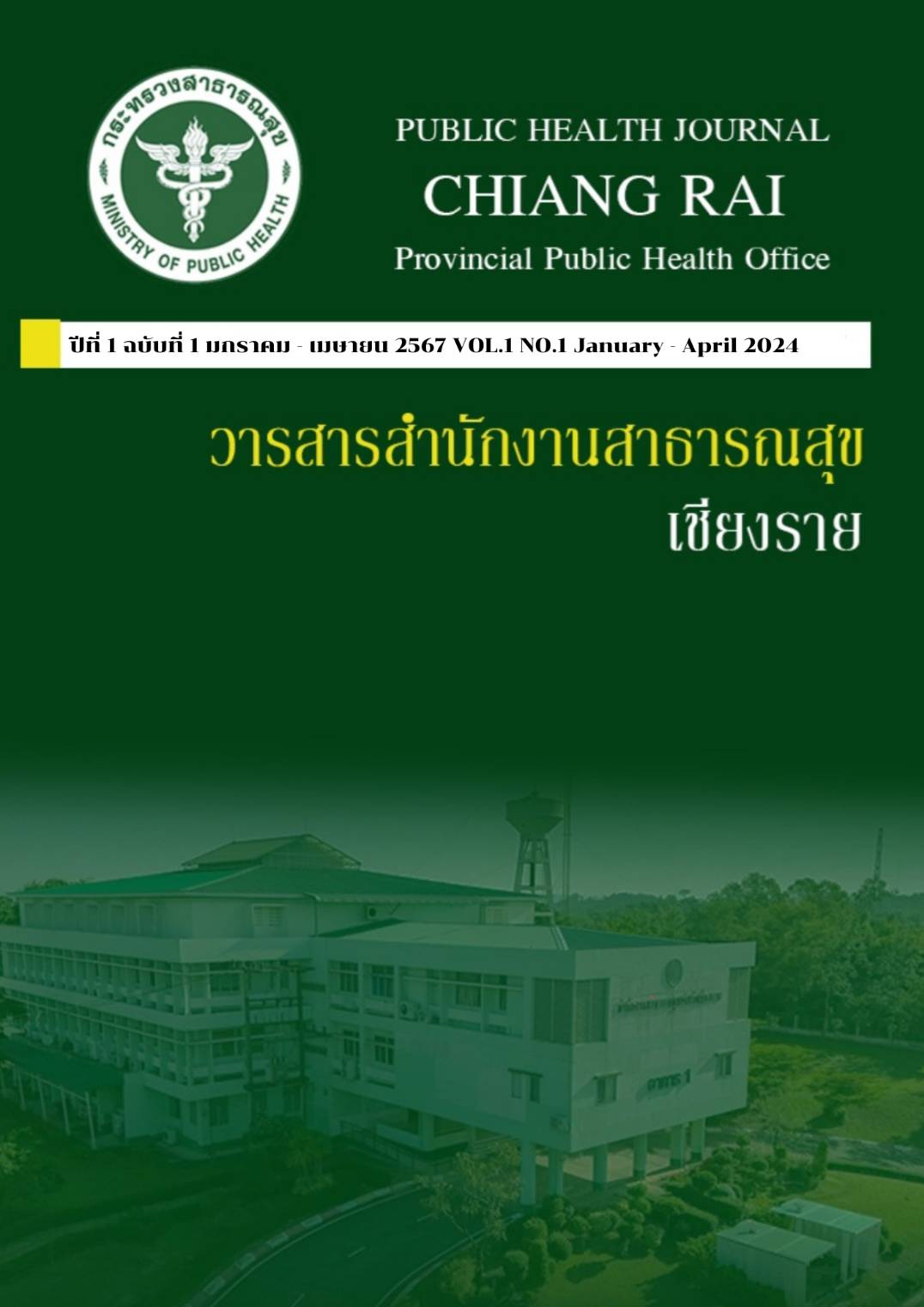The effectiveness of reality orientation therapy on cognitive function in elderly with dementia with behavioral psychological symptoms on the quality of life of Primary caregiver
Abstract
The effectiveness of reality orientation therapy on cognitive function in elderly with dementia with behavioral psychological symptoms on the quality of life of Primary caregiver
Jidapa Kramudkwam1, Siam Kumsriwas1, Onnalin Singkorn2 , Pimrat Boonyapak 2 , Nattaya Phadannok2 and Prapatsorn Thammatha2
Abstract
This quasi-experimental study aimed at investigating the quality of life issues. It compares quality of life scores before and after using a perception-based training program and compares quality of life scores between the group receiving the program along with medication treatment alone in primary caregivers of elderly individuals with behavioral and psychological symptoms of dementia.
The sample consisted of caregivers who had been providing care for at least six months, dedicating a minimum of six hours per day, aged 20 years and above, proficient in the Thai language, and free from physical or mental health conditions hindering their participation. Thirty participants were divided into experimental and control groups. Research tools included personal questionnaires, the World Health Organization Quality of Life assessment (Thai version)1, and a cognitive training program developed by the researcher. Data analysis involved qualitative content analysis and descriptive and inferential statistics, including Two-way repeated ANOVA.
The findings revealed significant differences in the quality of life scores between the experimental and control groups at a statistical significance level of 0.05. Significant differences were also observed pre- and post-program and during follow-up at a statistical significance level of 0.05. Moreover, the group receiving cognitive training program incorporating reality orientation therapy shows improved quality of life scores after the experiment and at the end of the follow-up period compared to before the experiment at a statistical significance level of 0.05, but there are no significant differences between the scores at the end of the follow-up period and after the experiment. As for the control group, there are no significant differences in the quality of life scores before the experiment, after the experiment, and at the end of the follow-up period.
Keywords: Dementia, Reality Orientation, Cognitive Functioning, Quality of Life, Caregivers
References
World Health Organization. Dementia [Internet]. 2023 [cited 2023 Oct 28]. Available from:https://www.who.int/news-room/fact-sheets/detail/dementia#:~:text=Rates% 20of%20dementia,and%20139%20million%20in%202050
Cao Q, Tan CC, Xu W, Hu H, Cao XP, Dong Q, et al. The prevalence of dementia: a systematic review and meta-analysis. JAD 2020; 73(3): 1157-66.
Nichols E, Steinmetz JD, Vollset SE, Fukutaki K, Chalek J, Abd-Allah F, et al. Estimation of the global prevalence of dementia in 2019 and forecasted prevalence in 2050: an analysis for the Global Burden of Disease Study 2019. The Lancet Public Health 2022; 7(2): e105-25.
Prince M, Ali GC, Guerchet M, Prina AM, Albanese E, Wu YT. Recent global trends in the prevalence and incidence of dementia, and
survival with dementia. Alzheimers Res Ther 2016; 8: 1-13.
ภรัญวิทย์ อนันต์ดิลกฤทธิ์. ภาวะสมองเสื่อม. วารสารส่งเสริมสุขภาพและอนามัยสิ่งแวดล้อม 2564; 15(17): 392-8.
Huang SS, Wang WF, Liao YC. Severity and prevalence of behavioral and psychological symptoms among patients of different dementia stages in Taiwan. Rev Psiquiatr Clín 2017; 44: 89-93.
Chiu HY, Chen PY, Chen YT, Huang HC. Reality orientation therapy benefits cognition in older people with dementia: A meta-analysis. Int J Nurs Stud 2018; 86: 20-8.
Metitieri T, Zanetti O, Geroldi C, Frisoni GB, De Leo D, Buono MD, et al. Reality orientation therapy to delay outcomes of progression in patients with dementia. A retrospective study. Clinical Rehabilitation 2001; 15(5): 471-8.
Camargo CH, Ladeira MA, Serpa RA, Jobbins VA, Filho CR, Welling LC, et al. The effectiveness of reality orientation therapy in the treatment of Parkinson disease dementia. American Journal of Alzheimer's Disease & Other Dementias 2019; 34(2): 124-30.
Calabrese CM, Calabrese MC, Calabrese CM. The rehabilitation of the elderly in cognitive difficult: an integrated vision. Reality Orientation Therapy (R.O.T.) and the “caring” of relationship of diade elderly-care-giver. J Clin Psychiatry Cog Psychol 2018; 2(2): 1-4.
Maggio MG, De Domenico C, Manuli A, Latella D, Marra A, La Rosa G, et al. Alzheimer cafè: toward bridging the gap between cure and care in patients with dementia. International Journal of Neuroscience 2023; 133(9): 1024-30.
World Health Organization. . WHOQOL : measuring quality of life.1997. [cited 2024 Apr 11].Availablefrom:https://iris.who.int/handle/10665/63482
กรมสุขภาพจิต.เครื่องชี้วัดคุณภาพชีวิตขององค์การอนามัยโลกชุดย่อฉบับภาษาไทย; 2559.[เข้าถึงเมื่อ 11 เมษายน 2567] เข้าถึงได้จาก: https://dmh.go.th/test/whoqol/
ศิริพันธุ์ สาสัตย์.การพยาบาลผู้สูงอายุ:ปัญหาที่พบบ่อยและแนวทางในการดูแล. พิมพ์ครั้งที่ 3. กรุงเทพฯ : สำนักพิมพ์แห่งจุฬาลงกรณ์มหาวิทยาลัย; 2554.
ชาลินี สุวรรณยศ, ดาราวรรณ ต๊ะปินตา. การลดความเครียดในผู้ดูแลผู้ที่เป็นโรคสมองเสื่อม. วารสารการพยาบาลจิตเวชและสุขภาพจิต. 2563; 34(2): 1-17.
ดุจปรารถนา พิศาลสารกิจ ปิติพร สิริทิพากร วีรศักดิ์ เมืองไพศาล. ผลของโปรแกรมการอบรมผู้ดูแลต่อคุณภาพชีวิตและความรู้สึกเป็นภาระของผู้ดูแลผู้ป่วยที่มีภาวะสมองเสื่อม.วารสารการพยาบาลและการดูแลสุขภาพ. 2563; 38(2), 63-72)
Spector, A., Orrel, M., Davies, S., & Woods, B. Reality orientation for dementia: A systematic review of the evidence of effectiveness form randomized controlled trails. The Gerontologist 2000; 40(2), 206-212.
สุวัฒน์ มหัตนิรันดร์กุล, วิระวรรณ ตันติพิวัฒนสกุล, วนิดา พุ่มไพศาลชัย, กรองจิตต์ วงศ์สุวรรณ, ราณี พรมานะจิรังกุล. เปรียบเทียบแบบวัดคุณภาพชีวิตขององค์การอนามัยโลกชุด 100 ตัวชี้วัด และ 26 ตัวชี้วัด. เชียงใหม่: โรงพยาบาลสวนปรุง จังหวัดเชียงใหม่ กรมสุขภาพจิต กระทรวงสาธารณสุข; 2540.
ณัฐวรรณ พินิจสุวรรณ กนกพร สุคำวัง และ ภารดี นานาศิลป์.ปัจจัยทำนายคุณภาพชีวิตของผู้ดูแล
ผู้สูงอายุที่มีภาวะสมองเสื่อม. พยาบาลสาร. 2561; 45(2), 1-13)
พาวุฒิ เมฆวิชัย, สุรินทร์ แซ่ตัง. ผลกระทบจากการดูแลผู้ป่วยภาวะสมองเสื่อมในประเทศไทย.
วารสารสมาคมจิตแพทย์แห่งประเทศไทย 2556; 58(1): 101-10.
ศิราณี ศรีหาภาค, โกมาตร จึงเสถียรทรัพย์, คณิศร เต็งรัง. ผลกระทบและภาระการดูแลผู้สูงอายุระยะยาวภายใต้วัฒนธรรมไทย. กรุงเทพฯ : สถาบันวิจัยระบบสาธารณสุข มูลนิธิสถาบันวิจัยและพัฒนาผู้สูงอายุไทย สํานักนโยบายและยุทธศาสตร์ กระทรวงสาธารณสุข; 2556.
ศศิพัฒน์ ยอดเพชร. โครงการระบบการดูแลระยะยาวในครอบครัวสำหรับผู้สูงอายุ: รายงานการวิจัยฉบับสมบูรณ์. กรุงเทพฯ: คณะสังคมสงเคราะห์ศาสตร์ มหาวิทยาลัยธรรมศาสตร์; 2549.
พัฒน์ศรี ศรีสุวรรณ. แผนการดูแลแบบองค์รวมสำหรับภาวะสมองเสื่อม. วารสารอายุรศาสตร์ มหาวิทยาลัยขอนแก่น 2561; 4(3): 28-35.
ปรียธิดา ชลศึกเสนีย์, วรรณภา ศรีธัญรัตน์. การจัดการของครอบครัวในการดูแลผู้สูงอายุภาวะสมองเสื่อม.วารสารการพยาบาลและการศึกษา 2565; 15(2): 26-40.
สุภัทรา จันทร์คำ. ผลของโปรแกรมฝึกสมองต่อหน้าที่ด้านการรู้คิดของผู้สูงอายุที่มีความบกพร่อง
Downloads
Published
How to Cite
Issue
Section
License
Copyright (c) 2024 Chiang Rai Provincial Health Office

This work is licensed under a Creative Commons Attribution-NonCommercial-NoDerivatives 4.0 International License.
บทความที่ได้รับการตีพิมพ์เป็นลิขสิทธิ์ของสำนักงานสาธารณสุขจังหวัดเชียงราย
ข้อความที่ปรากฏในบทความแต่ละเรื่องในวารสารวิชาการเล่มนี้เป็นความคิดเห็นส่วนตัวของผู้เขียนแต่ละท่านไม่เกี่ยวข้องกับสำนักงานสาธารณสุขจังหวัดเชียงราย และบุคลากรท่านอื่น ในสำนักงานสาธารณสุขจังหวัดเชียงราย แต่อย่างใด ความรับผิดชอบองค์ประกอบทั้งหมดของบทความแต่ละเรื่องเป็นของผู้เขียนแต่ละท่าน หากมีความผิดพลาดใด ๆ ผู้เขียนแต่ละท่านจะรับผิดชอบบทความของตนเองแต่ผู้เดียว



